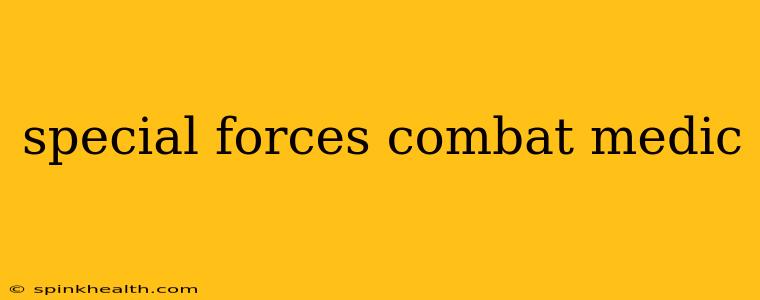The air crackles with tension. Dust swirls around you, kicked up by the frantic scramble of boots on parched earth. Gunfire echoes in the distance, a chilling soundtrack to the chaos unfolding. This isn’t a Hollywood movie; this is the reality of a Special Forces Combat Medic. It’s a world where the line between life and death is razor-thin, and where the skills of a highly trained medical professional are as crucial as a soldier's marksmanship. This isn't just a job; it's a calling, a relentless pursuit of excellence in the face of unimaginable pressure.
This article will delve into the life of a Special Forces Combat Medic, exploring the rigorous training, demanding responsibilities, and unwavering dedication required for this elite role. We'll also answer some frequently asked questions surrounding this profession.
What Does a Special Forces Combat Medic Do?
The role transcends simple first aid. A Special Forces Combat Medic is a highly skilled paramedic, often exceeding the capabilities of civilian counterparts. They're responsible for providing immediate, life-saving medical care in hostile and unpredictable environments – often under intense fire. Their expertise extends far beyond battlefield trauma; they must be adept at treating a wide range of injuries and illnesses, from gunshot wounds and traumatic amputations to managing infectious diseases and performing complex procedures with limited resources. They’re often the only medical professional available for days, or even weeks, relying on their skills and ingenuity to keep their team alive. Think of them as battlefield surgeons, paramedics, and nurses all rolled into one, with the added challenge of operating within a high-stakes military environment.
What is the Training Like for a Special Forces Combat Medic?
The path to becoming a Special Forces Combat Medic is arduous and intensely competitive. It begins with rigorous basic training, followed by specialized medical school and paramedic training, often surpassing civilian standards. Then comes the grueling Special Forces selection process, which pushes candidates to their physical and mental limits. Once selected, the training continues, honing their skills in combat medicine, tactical combat casualty care (TCCC), and working within a Special Forces unit's operational environment. This involves extensive field training exercises (FTXs) in diverse and challenging terrain, simulating real-world scenarios with a relentless focus on precision and efficiency under pressure. They learn to adapt to ever-changing circumstances, making split-second decisions that can mean the difference between life and death.
What are the Specific Skills Required to be a Special Forces Combat Medic?
Beyond advanced medical knowledge, a Special Forces Combat Medic needs a unique skillset:
- Advanced Medical Skills: Trauma management, surgery (in austere environments), IV insertion, medication administration, wound care, splinting, and more.
- Tactical Skills: Weapons proficiency, navigation, communication, and close-quarters combat.
- Physical Fitness: Exceptional strength, endurance, and agility are mandatory to keep pace with the demands of special operations.
- Mental Fortitude: The ability to remain calm and focused under extreme stress, dealing with gruesome injuries and the emotional toll of combat.
- Teamwork: Effective collaboration within a highly skilled and specialized team is paramount.
What are the Career Prospects for a Special Forces Combat Medic?
The skills honed as a Special Forces Combat Medic translate exceptionally well into civilian life. Many transition into high-demand roles within emergency medicine, search and rescue, or private security sectors. The experience, resilience, and expertise gained are highly valued, opening doors to leadership positions and opportunities for continued professional development.
What is the Difference Between a Regular Army Medic and a Special Forces Combat Medic?
While both provide vital medical support, the scope and intensity differ significantly. A regular Army medic typically operates within a larger unit, with potentially more resources and support. Special Forces Combat Medics, however, are integral members of smaller, highly specialized teams operating in remote and hostile environments, often with minimal support and facing far greater risks. Their training is more extensive, and their responsibilities encompass a wider range of medical and tactical skills.
How Long is the Training to Become a Special Forces Combat Medic?
The length of training varies depending on the specific branch of the military and the individual's prior medical experience, but expect a commitment of several years encompassing basic training, medical school, specialized training, and rigorous Special Forces selection and training.
The life of a Special Forces Combat Medic is demanding, dangerous, and deeply rewarding. It requires an unwavering commitment to excellence, a profound sense of duty, and an unparalleled level of skill. They are unsung heroes, operating in the shadows, ensuring their teammates return home. Their dedication and expertise are crucial to the success of Special Forces operations around the globe.

